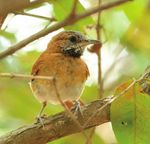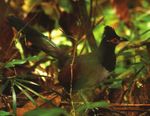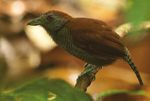An update on birding in guyana - following the neotropical bird club guyana 2009 tour chris collins and Barry walker
←
→
Page content transcription
If your browser does not render page correctly, please read the page content below
>> feature An update on birding in Guyana
An update on birding in Guyana
following the Neotropical Bird Club Guyana 2009 tour
Chris Collins and Barry Walker
Continuing the saga on the birds of Guyana, two top bird
guides demonstrate why this small country should be held
in the highest praise when speaking of birds.
Rufous-winged Ground Cuckoo
Neomorphus rufipennis is one of
the top specialities possible at Atta
Rainforest Lodge (Clive Good)
26 Neotropical Birding 7I
n late November 2009, nine members of (Endangered), Rio Branco Antbird Cercomacra
the Neotropical Bird Club (NBC) joined carbonaria (Near Threatened) and Hoary-throated
Barry Walker and Chris Collins for a highly Spinetail Synallaxis kollari (Endangered)2,
successful 17-day bird tour to Guyana. The twin this modest town makes an excellent base.
objectives of the trip were to look for a range of On the tour we spent three days making a
poorly known species whilst at the same time series of day trips to look for these species.
raising important funds for the Club. The trip Undoubtedly the most spectacular of these
exceeded expectations on both fronts with over four is the Sun Parakeet which 30 years ago was
£4,000 raised for NBC and 385 species recorded. common across the Guianas. Huge numbers were,
These included an excellent selection of Guianan however, caught for the cagebird trade and by the
Shield endemics as well as ten species of cotingas, late 1980s the only place where it could be found
14 woodpeckers, 31 antbirds and 17 parrots. in Guyana was near the isolated community of
In this article, we describe some of the Karasabai. This village is on the border with Brazil
locations visited on the tour that were not referred in south-west Guyana and even here the birds
to in a previous article published in Neotropical were trapped in vast numbers. For reasons which
Birding1, and provide further information on remain a mystery, when the number of birds was
some of the sites that were covered earlier. reputed to have reached single figures, the villagers
decided to ban trapping and began protecting the
Coastal birding near birds. Since then, numbers have slowly increased
and there are now thought to be about 300 or so
Georgetown parrots in the area. Despite this, finding them can
Although Guyana has received many international present a challenge and anyone contemplating
plaudits for its commitment to preserve the a visit should obtain advance permission, as the
thousands of square kilometres of untouched community is unfamiliar with the concept of
rainforests that remain within the country’s birders, and remain suspicious of anyone who
borders, unfortunately, the same cannot be said they consider could be a parrot trapper. During
for the mangroves and coastal woodlands which the tour we visited an area approximately 6 km
continue to be cleared at an alarming rate. from the village, where we enjoyed great looks at
These habitats are home to three restricted- nine parakeets with one pair occupying a nesting
range birds, Blood-coloured Woodpecker hole. The birds do, however, range widely and
Veniliornis sanguineus, White-bellied Piculet an alternative option is to hire a boat and search
Picumnus spilogaster and Rufous Crab Hawk along the nearby river where at least 30 individuals
Buteogallus aequinoctialis. On the tour we visited were seen by CC on a previous visit in 2008.
an area known as Abary Bridge, approximately Rio Branco Antbird and Hoary-throated
50 km east of Georgetown, and were able to Spinetail occur in the highly fragmented and
find all three species. This is one of the few threatened gallery forest along the rio Branco
areas where suitable vegetation still remains. (in Brazil) and its main tributaries. Although
Another poorly known species around Abary Lethem is located on the Takatu River (a tributary
is the Guianan Gnatcatcher Polioptila guianensis. of the Branco), neither species seems to have
Despite extensive searches we have never seen been found along this waterway despite the
the Guianan Piculet Picumnus minutissimus in existence of seemingly suitable habitat. On the
this area. The River Courantyne, which separates tour, therefore, we visited another tributary (the
Guyana from neighbouring Suriname, might well Ireng River) which can be reached in the dry
serve as a natural barrier for the piculet, which season by a 4×4. When conditions are wetter, it
seems to be reasonably common in Suriname is necessary to hire a boat in Lethem and travel
but is apparently replaced by White-bellied down the Takatu for a couple of hours to its
Piculet P. spilogaster on the Guianan side. confluence with the Ireng. Recent agricultural
expansion has seriously reduced the available
habitat for these two species but both can be
Lethem, southern Guyana found within a couple of kilometres of the
The area around Lethem in southern Guyana confluence of the Takatu and Ireng Rivers, and
is rarely visited by birders, however, for those on the tour we enjoyed good looks at both birds.
wanting to see some of Guyana’s real specialities, The final speciality is Red Siskin, another
namely Sun Parakeet Aratinga solstitialis species which has been decimated by the
(Endangered), Red Siskin Carduelis cucullata cagebird trade and is now extinct across much
Neotropical Birding 7 27>> feature An update on birding in Guyana
Opposite page, clockwise from top:
Grey-winged Trumpeter Psophia crepitans (Hadoram
Shirihai/Birds of the world: a photographic handbook).
Although Grey-winged Trumpeters can be found
throughout much of northern Amazonia, they are
especially numerous in parts of Guyana
Following a marked population decline due to intensive
trapping for the cagebird trade, the Sun Parakeet Aratinga
solstitialis is slowly recovering and can be seen near
Karasabai village on the border with Brazil (Chris Collins)
Above, top and inset right: Red Siskin Carduelis cucullata Female Black-throated Antshrike Frederickena viridis
(Hadoram Shirihai/Birds of the world: a photographic (Hadoram Shirihai/Birds of the world: a photographic
handbook) suffered a marked population decline due handbook)
to the cagebird trade and is treated as Endangered Hoary-throated Spinetail Synallaxis kollari (Hadoram
by BirdLife International, but can be found close to Shirihai/Birds of the world: a photographic handbook).
Dadanawa Ranch This Endangered species is only found in gallery forest
Above, middle and bottom: Rufous-winged Ground Cuckoo along the rio Branco and some of its tributaries. Lethem
Neomorphus rufipennis is one of the top specialities makes an excellent base as the species can be found
possible at Atta Rainforest Lodge (Clive Good)” along the nearby Ireng River
Female Crimson Fruitcrow Haematoderus militaris
(Hadoram Shirihai/Birds of the world: a photographic
handbook); the clearing at the Atta Rainforest Lodge is
28 Neotropical Birding 7 probably one of the most reliable sites in the world for this
spectacular Guianan speciality>> feature An update on birding in Guyana
of its former range, with many of the remaining
populations seriously fragmented. It was only in
Atta Rainforest Lodge,
recent years that it was discovered in Guyana, central Guyana
with this population being over 950 km from The major attraction at Atta Lodge is a 154-m-long
the nearest known site in Venezuela. Today, canopy walkway which allows visitors to get
however, the Guyanese birds are being studied great looks at an excellent range of species
and protected from bird-trappers by an active (see Neotropical Birding 2 article for further
local conservation society. With their assistance details). Birding around the lodge clearing can
one stands a good chance of finding this also be very productive and this is probably
spectacular bird. Three Red Siskins were seen by the most reliable place in Guyana for the
tour members at one locality; however, to protect spectacular Crimson Fruitcrow Haematoderus
the birds we will not publish further details here militaris, and an excellent site for Black
and recommend that anyone who wishes to Curassow Crax alector, as there is a family party
look for this species contact Dadanawa Ranch. which regularly pass through the clearing.
For those with sufficient time, the Perhaps the most important target at Atta
‘conventional’ strategy is to stay at Dadanawa is the poorly known White-winged Potoo
Ranch for two or three days, although if your Nyctibius leucopterus (treated to a photospot in
time is limited it is possible to get to some Neotropical Birding 6: 72–75) which seems to be
of the sites on a day trip from Lethem. Be not uncommon in the area. After dark it can be
warned, however, the journey is similar to found at both the walkway and around the lodge
that to Karasabai and is a gruelling 4 hours in clearing. To stand any chance of seeing this potoo,
each direction on extremely rough tracks! one generally needs a bright moon-lit night as
well as some good fortune: on the tour we enjoyed
Surama, central Guyana scope views of a bird illuminated by torchlight.
A few details about visiting this delightful eco- Other specialities which can be seen
lodge were provided in a previous article in here include the range-restricted Black-
Neotropical Birding1. Subsequently, considerably throated Antshrike Frederickena viridis as
more research has been undertaken and some well as more widespread species such as
important birds have been recorded in the area, Grey-winged Trumpeter Psophia crepitans,
making a visit strongly recommended. Indeed Red-fan Parrot Deroptyus accipitrinus, Tiny
this area is probably one of the best places Tyrant-Manakin Tyranneutes virescens and
in the Neotropics to look for Rufous-winged Pompadour Cotinga Xipholena punicea.
Ground Cuckoo Neomorphus rufipennis and
we have seen this species on five occasions. REFERENCES
Despite this, it remains a tough species to 1. Collins, C. (2007) Guyana: South America’s
find and although we heard it on the tour, overlooked birding destination. Neotrop. Birding 2:
69–75.
the bird did not come in to playback.
Another recent discovery is a Harpy Eagle 2. BirdLife International (2009) Species factsheets:
Synallaxis kollari, Cercomacra carbonaria, Carduelis
Harpia harpyja nest only a couple of kilometres
cucullata. www.birdlife.org/datazone
from the village. Birders staying at the eco-
lodge are able to visit this with one of the local
guides. Unfortunately at the time of the tour, CHRIS COLLINS
the chick had fledged, although since then the 9 Pound Close, Long Ditton, Surbiton, Surrey KT6 5JW,
adult birds have returned regularly to the nest. UK. E-mail: chris@birdsandwildlife.com
Other regional endemics which can be seen
BARRY WALKER
around Surama include Red-legged Tinamou Manu Expeditions, Jiron Clorinda Matto de Turner # 330,
Crypturellus erythropus, Painted Parakeet Urbanización Magisterial Cusco, Peru.
Pyrrhura picta, Guianan Puffbird Notharchus E-mail: bwalker@terra.com.pe
macrorhynchos, Spot-tailed Herpsilochmus
sticturus and Todd’s H. stictocephalus Antwrens,
Guianan Warbling Antbird Hypocnemis cantator,
Blue-backed Tanager Cyanicterus cyanicterus
and Finsch’s Euphonia Euphonia finschi.
30 Neotropical Birding 7You can also read


























































